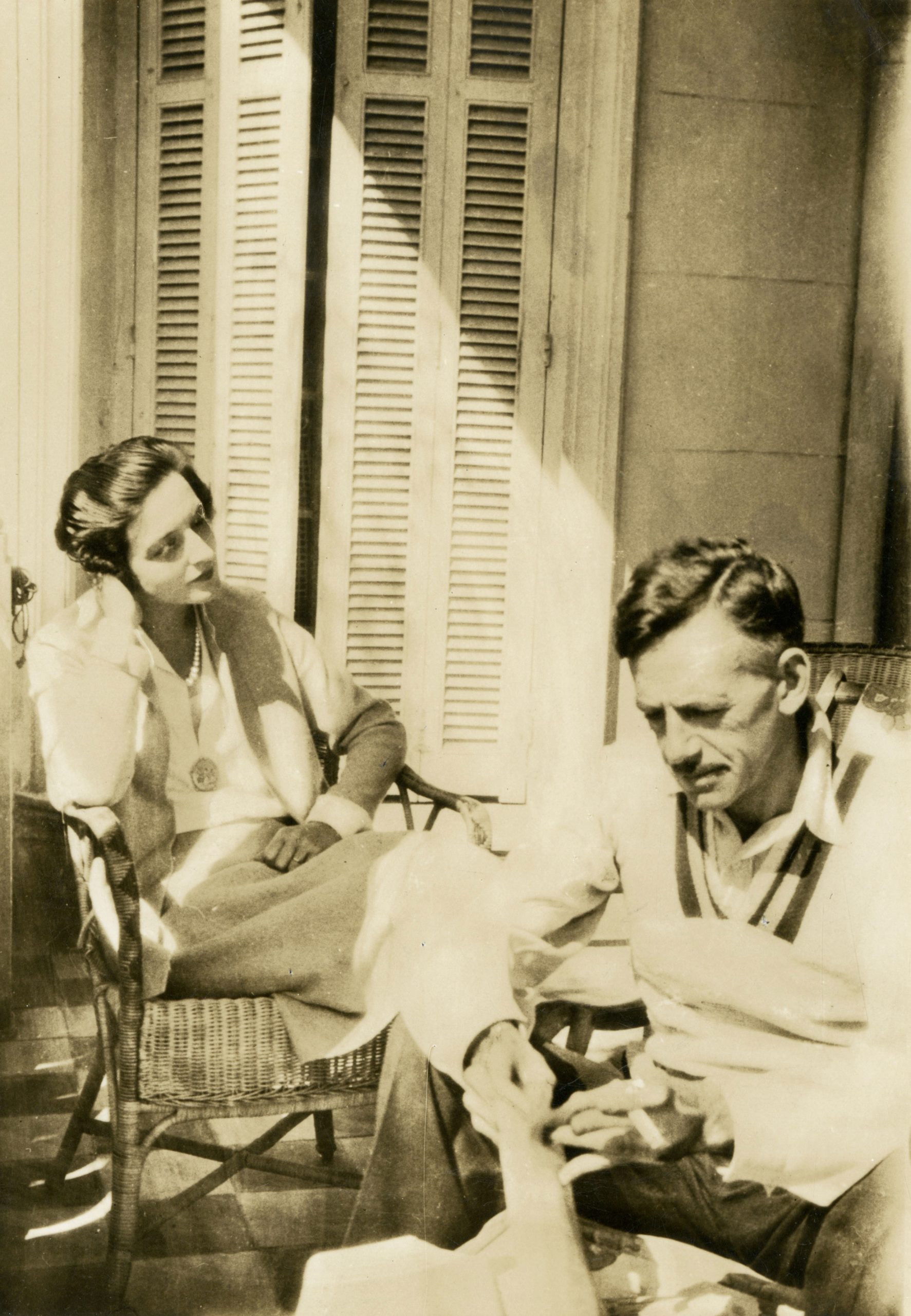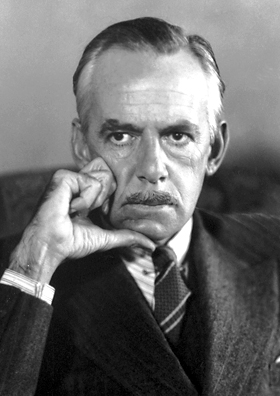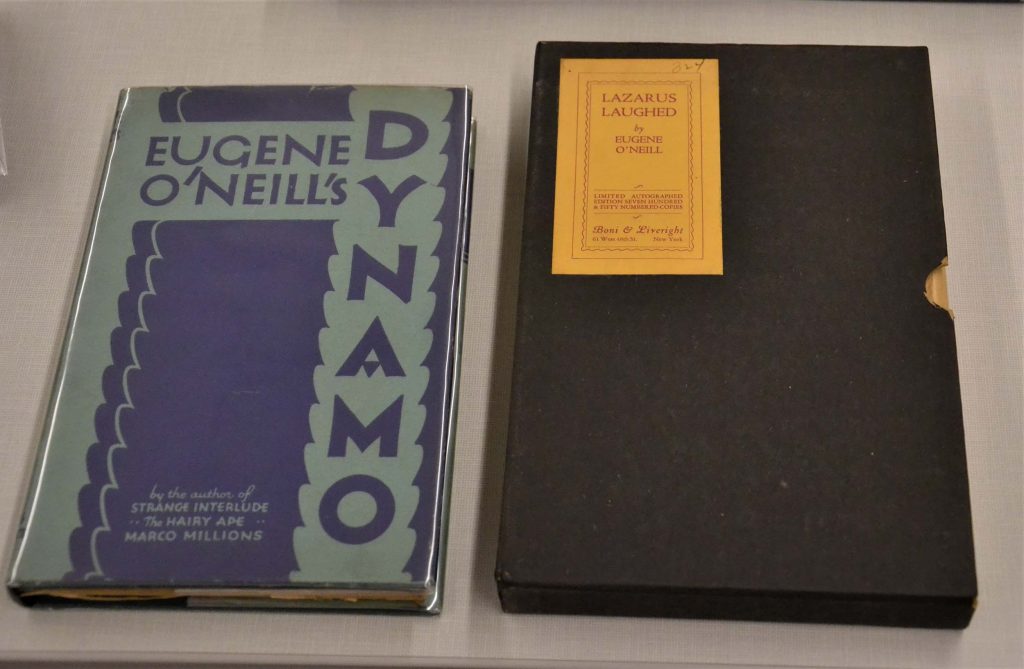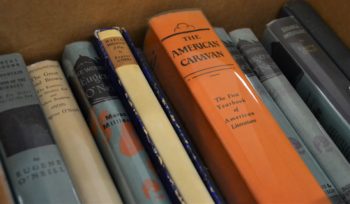Eugene O’Neill

The Harley Hammerman Collection of Eugene O’Neill consists of manuscripts, correspondence, photographs, and other materials related to the life and work of playwright Eugene O’Neill. Along with first editions of the playwright’s works located in Rare Books, the collection features autographs and typed letters written by O’Neill to significant cultural figures; handwritten manuscripts and typescripts; photographs of O’Neill and his immediate family and friends; and rare handbills, posters, scripts, recordings, films, and promotional books related to productions of his plays.
Eugene Gladstone O’Neill (October 16, 1888 – November 27, 1953) was an American playwright and Nobel laureate in literature. O’Neill was born in a Broadway hotel room in Longacre Square (now Times Square), in the Barrett Hotel, to an Irish immigrant father and a mother of Irish descent.
O’Neill’s father was an actor and his mother accompanied him on frequent theater company tours, so Eugene was sent to a Catholic boarding school where he discovered a love of reading. O’Neill decided to devote himself full-time to writing plays after his experience in 1912-13 at a sanatorium where he was recovering from tuberculosis. O’Neill had previously written poetry and been employed by the New London Telegraph, as a reporter.

In the 1910s, O’Neill became a part of the Greenwich Village literary scene, including the Provincetown Players, which staged his early plays, and where “radical” thinkers like Communist Labor Party founder John Reed influenced his work. O’Neill brought to American drama techniques of realism earlier associated with Russian playwright Anton Chekhov, Norwegian playwright Henrik Ibsen, and Swedish playwright August Strindberg. O’Neill’s plays were among the first to include speeches in American vernacular and involve characters on the fringes of society where they struggle to maintain their hopes and aspirations, but ultimately slide into disillusionment and despair.
O’Neill’s first published play, Beyond the Horizon, opened on Broadway in 1920 to great acclaim and was awarded the Pulitzer Prize for Drama. His first major hit was The Emperor Jones, which also ran on Broadway in 1920, and obliquely commented on the U.S. occupation of Haiti that was a topic of debate in that year’s presidential election.
O’Neill’s best-known plays include Anna Christie (Pulitzer Prize 1922), Desire Under the Elms (1924), Strange Interlude (Pulitzer Prize 1928), Mourning Becomes Electra (1931), and his only well-known comedy, Ah, Wilderness!, a wistful re-imagining of his youth. In 1936, O’Neill received the Nobel Prize for Literature. After a ten-year hiatus, O’Neill’s now-renowned play The Iceman Cometh was produced in 1946; the following year, A Moon for the Misbegotten failed to make an impression but decades later gained recognition as among his best works.


O’Neill suffered from many illnesses in his life, including alcoholism and depression, and Parkinson’s-like tremors took away his ability to write the last ten years of his life, leaving many scripts unfinished. Similar to how he entered the world, O’Neill died in a hotel room in Boston, Mass., in 1953.
Both Iceman and Moon were heavily autobiographical, as was Long Day’s Journey Into Night, which was widely considered his finest but was published and produced posthumously. Although his written instructions had stipulated that Long Day’s Journey Into Night not be made public until twenty-five years after his death, it was published in 1956 and produced on stage to tremendous critical acclaim, winning the Pulitzer Prize in 1957. Other posthumously published works include A Touch of the Poet (1958) and More Stately Mansions (1967).
Access these Materials
Search the Harley Hammerman Collection on Eugene O’Neill on ArchivesSpace
Explore the Eugene O’Neill Research Guide
Visit the The Assembled Playwright Exhibition
Contact
- Department
- Special Collections, Special Collections, Preservation, and Digital Strategies
- Name
- Joel Minor
- Job Title
- Curator of Modern Lit Collection/Manuscripts
- Email Address
- joelminor@wustl.edu
- Phone Number
- (314) 935-5413
